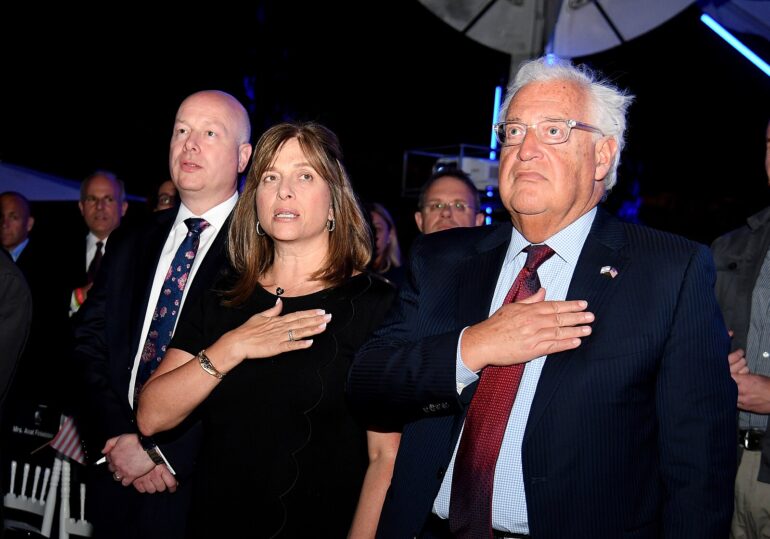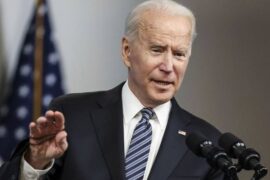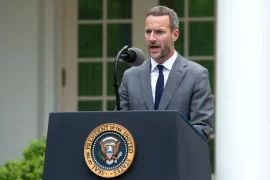Despite what might appear to be a promising title, former US Ambassador to Israel David Friedman’s One Jewish State fails to provide a creative solution or even a clear-eyed vision for Israel’s future. And perhaps worse, it propagates a highly problematic understanding of Jewish identity.
Friedman’s book, a large-typeface manifesto with appendices of seemingly irrelevant primary sources to justify a hardcopy print, is a compilation of tired and shallow hasbara talking points. More than a mere book, Friedman has self-professed his intention for the work to be a launching pad for a new movement that nearly manifested as a slate in the upcoming elections for the World Zionist Congress.
What surprised me most about this book, however, is not so much the content itself but rather the fact that some Diaspora Jews have suggested a comparison between the fundamental positions of Friedman’s argument and those commonly put forward by figures in the Vision movement.
This confusion appears to stem from the fact that both Friedman and Vision reject the two-state paradigm. From the confines of the organized pro-Israel community in the United States, standing firm against the partition of our land might seem novel. But here in Israel, it’s long been obvious to most sectors of the population that the “two-state solution” can only lead to further suffering and injustice. And many of us at Vision see ourselves as part of a long ideological tradition stretching back to even before renewed Jewish statehood that has always been opposed on principle to dividing this land.
Within Friedman’s book, there also appear to be some other policy positions that rhyme with many ideas that have been espoused by Vision for over a decade in various forms. Unfortunately, however, this is where the similarities end.
Far from a set of conclusions, Vision’s work presents fresh ways of thinking meant to inspire a new generation of Jews to develop their own conclusions within the ideological paradigm of our ancestors. It is this very fact that makes Friedman’s book problematic from the onset. Even conclusions that rhyme with Vision’s stem from a different place entirely. A defender of a “Judeo-Christian” civilization, Friedman’s creativity is limited to thinking within a Western paradigm, the very worldview our sages associate with Esav.
The Palestinian Question
We can observe Friedman’s intellectual limitations most evidently with his approach to the Palestinian question. While Vision’s work seeks to create the conditions for Jews and Palestinians to each experience victory in our subjective narratives and to become co-protagonists in a larger narrative where we can build a society that is more deeply Jewish yet more democratic and inclusive of the Other, Friedman’s solution seeks to essentially formalize an unjust and unequal system. Rather than attempting to transcend the so-called Zionist trilemma between a “Jewish” state, democracy, and the entire land of Israel, Friedman simply chooses to forgo democracy.
It also appears clear that the ambassador super-imposes positions onto Palestinians in an effort to straw man their arguments and ignore many of their legitimate aspirations.
The Orientalist lens through which Friedman analyzes Palestinians focuses on illegitimate leadership entities, usually denounced by most Palestinians, to paint them as “savage” and corrupt. What’s worse, he proscribes westernization as a solution for Palestinian society.
By parroting the stale arguments about Palestinians from the hasbara industry, Friedman suggests that Palestinians will submit to Israeli rule once they experience bourgeois prosperity. While it is true that improving the material conditions of Palestinians is an important step towards any future solution, Friedman’s example is telling of what he thinks about not only Palestinians but also Israelis.
“Palestinians, like Puerto Ricans, will not vote in national elections… Palestinians will be free to enact their own governing documents as long as they are not inconsistent with those of Israel.”
Insisting that the relationship Israel ought to have with Palestinians is similar to that which the US empire has with Puerto Rico reinforces the notion of Israel as a force of colonization in the region.
While Friedman claims that no one challenges US rule over Puerto Rico as colonial or racist, the reality is that Puerto Rico has had a vibrant independence movement for over a century. And many activists and scholars have looked to Puerto Rico as a prime example of contemporary American colonialism. Harold Peón, for example, wrote in 2020 for the Harvard Review:
Puerto Rico’s relationship with the U.S. is rooted in a history of discrimination. The island has been a territory of the United States since Spain ceded it in 1898, following America’s invasion of it during the Spanish-American War. Three years later, the Insular Cases of 1901 made clear that Puerto Ricans were bound to an unequal, colonial relationship grounded in racism in which the island’s residents were seen as inferior: The cases state the island is “inhabited by alien races” that could not understand “Anglo-Saxon principles,” and is, as a territory, “belonging to the United States, but not a part of the United States.”
It is not an aversion to colonialism that motivates One Jewish State, but rather being called out as “colonial.” This theme also is present when Friedman disparages pro-Palestinian student protestors for chanting “from the river to the sea” while advocating for the very same. Friedman presents Israel as a mini-America, just as he seems to view Jews as mini-Christians.
Judeo-Christian Israel
Both between the lines and explicitly within the text, David Friedman appears to be operating from a worldview soundly rejected by Israel’s sages stretching back thousands of years. From seemingly benign matters such as spellings pivoted towards Christian readers (such as Bethel and Hebron) to explicitly orienting Israel’s annexation of the West Bank as a restoration of Judeo-Christian values, David Friedman engages in intellectual gymnastics in order to maintain a particular expression of American Jewish identity that feels compatible with Christian society.
Proudly boasting of his friendship with missionary Pastor John Hagee – who once called Jews “unfinished Christians” – is reminiscent of Ben Shapiro’s inability to articulate the differences between the Jewish and Christian religions, as well as Rabbi Shmuely Boteach’s claim that “the hyphen between Jewish and Christian values is Jesus himself.”
Hagee’s Zionism is deeply cynical as he sees the Jewish return to our land as an essential step in the Christian End of Days. In creating a common vision, minimizing eschatological differences, the Jewish character of Friedman’s One Jewish State has been compromised.
To add insult to injury, Friedman boasts of working with former US Secretary of State Mike Pompeo on the film Route 60 for TBN, a Christian broadcasting network. The tagline of which, is Trace the Steps of Abraham, Jacob, and Jesus, on Israel’s most Famous Route.
Despite dedicating a chapter to Jewish identity in his book, he falls short of breaking free from assimilationist Haskala paradigms – identifying Judaism as a religion with national accents that could easily be built for the American experience. So many of the immutable conclusions that Friedman takes for granted are features of Jewish identity colonization and products of an intense effort to avoid offending the dominant population in the United States.
In what appears to be a shameless effort to sell Jewish identity to White Christian Republicans, Friedman’s framings of faith, the Creator, our ancient Scriptures, and religion are presented as near identical to those of Christian America.
Repeatedly suggesting that the Americans have a “Biblical duty” to support Israeli sovereignty in the West Bank plays into a narrative that casts Israel is a junior partner to the US empire. This destructive framing pits Jews against Muslims and Islamic values (some of which we actually share). It’s the sort of attitude that has legitimized accusations of Israeli colonialism, as a State of Israel in the Semitic region founded and preserved on Western values can by definition only be called a colonial entity.
As Rav Yehuda HaKohen has frequently argued, “the danger of accepting the myth of a ‘Judeo-Christian civilization’ is that it blurs the important differences between the Hebrew and Christian worldviews. Even if one can argue from a Jewish perspective that the spread of Christianity has played a positive role in improving the world, it’s still crucial to recognize that a ‘Judeo-Christian civilization’ is actually just Christian civilization with acknowledgement that some concepts were taken from the ancient Hebrews.”
Uncle Sam’s Role in Israel’s affairs
When analyzing David Friedman’s One Jewish State, it seems almost superfluous to write of the greatest daylight between our respective visions for Israel. While ostensibly advocating for applying Israeli sovereignty to the lands won from Jordan during the 1967 Six Day War – a long-held Jewish aspiration – he does caveat that it should be done in coordination with a friendly administration in Washington (with American permission).
While clearly ignorant of how US imperialism operates, Friedman took President Joe Biden to task on the Mislaibled podcast, castigating him for his apparent flip-flopping on Israel. What Washington ought to do, he argued, is to determine “how we get the right result for the region? How do we make Israel stronger? How do we make America stronger?”
Friedman is quick to fault Democratic administrations for restraining Israel but only places the blame on Israeli leaders for surrendering the Gaza region – despite the fact that Prime Minister Ariel Sharon was acting under pressure from US President George W. Bush.
Rather than critiquing US interference in Israel’s policy decisions, Friedman selectively challenges interference he does not like. After all, he writes positively about working with President Donald Trump’s administration to impose the “Deal of the Century” on Palestinians and Israelis.
Friedman’s book suggests that Israel can thrive in the role of a client state to the US empire and that American involvement in Israel’s internal political decisions is fine so long as Washington’s dictates align with Friedman’s political views. But completely absent from the book is any discussion of Israeli independence from the US.
Jewish Identity & Israel
In every instance that Trump’s former ambassador to Israel referenced “my” or “our” country, it was in reference to the United States. This suggests that the intended audience may very well be the American right, or that Friedman’s understanding of Jewish identity is retrofitted to reach certain conclusions consistent with the Republican party’s values.
To his credit, in the 200-page manifesto, David Friedman does not even pay shallow lip service to the argument that Jews are indigenous to the land of Israel. Either because it is obvious or because he recognizes the contradictions and dire ramifications that may undermine the rest of his worldview. It would challenge his relationship with the United States – itself a glowing example of settler colonialism and no friend to indigenous peoples globally. It would also threaten a neat American Jewish identity that underscores Friedman’s book.
In discussing Jewish identity, Friedman cannot depart from the notion of Jewishness as a religious identity, even while arguing the importance of nationhood to Jewish identity. Friedman underscores the theological significance of national claims to the land of Israel, as though it is merely a tenet of our religion.
It should come as no surprise that David Friedman’s articulation of Jewish identity is remarkably similar to American Christian identity, albeit with nationalism.
Perhaps for this reason, Friedman devotes a chapter to downplaying violence by West Bank Jews and argues that the majority of Jews who live east of the Green Line live in modern cities. Rather than exploring the authentic features of Jewish identity and US-imposed conditions that beget violence from certain Jews, Friedman prefers to dismiss the phenomenon in favor of emphasizing the Jewish communities more culturally familiar to rightwing American readers. What’s “normal” for Friedman are not the Judean villagers but the westernized suburbanite settlers.
In his framings, Friedman presents a vision for Israel much more compatible with Evangelical Christian and conservative American sensibilities than with those of our ancestors. In so doing, One Jewish State offers no psychological liberation from the forces of empire.
Conclusion
There is certainly value to David Friedman’s rejection of the two-State paradigm and this book is a testament to the fact that it’s becoming easier to challenge this decades-old approach that the US empire has superimposed on us. Despite the aesthetics of Friedman’s plan being attractive, a deep dive with a critical eye exposes the flawed thinking that Trump’s former ambassador is bringing forward.
Even though some of his policy ideas may rhyme with thinking found in the Vision camp, the crucial differences outlined here expose core ideological differences. As we strive to decolonize Jewish identity and learn how to see contemporary social and political issues through the worldview of our ancestors, Friedman appears ignorant of the contradictions between Western and Jewish civilizations and threatens to further erase our identity to become a mere religion like Christianity without Jesus. At Vision, we seek to break free of paradigms that have enslaved our people for millennia, while One Jewish State operates nearly entirely within those paradigms.
If we hope to envision a truly just future with Israeli sovereignty from the river to the sea, we must be more creative. We must seek to create something here that is more authentic both to our own identity and to the region around us.
We must do the work of unearthing an authentic Hebrew vision for humanity rather than an imperialist Roman vision cloaked in Jewish garb. So long as we insist on remaining within the ideological paradigms David Friedman cannot break free from, we will never resolve the major contemporary challenges confronting the people of Israel.





